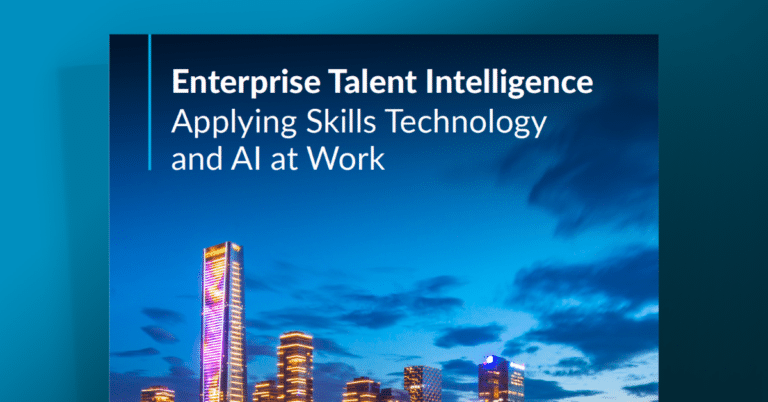
Enterprise talent intelligence: Applying skills technology and AI at work
Enterprise talent intelligence: Applying skills technology and AI at work
The Emergence of Talent Intelligence
The world of work has radically changed. Today businesses transform faster than ever, with 45% of CEOs anticipating their company as defined today will not exist in 10 years.1 Moreover, every company is in a war for skills. The labor market is getting younger and more demanding, unemployment remains low, and employees operate like gig workers.
The History of Talent Management
Evolving from the mainframe HR systems of the 1980s, companies purchased a multitude of HR systems to automate HR processes. These included applicant tracking systems (ATSs), learning management systems (LMSs),
and independent tools for career management, sourcing, and various HR functions. While this wave of innovation was promising, it created data silos and prevented a comprehensive understanding of the employee lifecycle.
In response to this trend, during the early 2000s, companies pursued an “integrated talent management strategy.” This led to a major consolidation of vendors: Oracle acquired Taleo; SAP acquired SuccessFactors; Workday was launched; and many other vendors were acquired—all with the intention
of building a single integrated talent management platform within a single vendor offering.
While the concept seemed logical, it essentially just automated HR practices akin to how supply chain or manufacturing procedures are automated. These integrated systems, designed to carry out HR processes, essentially acted as “people supply chain systems.” Built around the construct of jobs and job descriptions, this integrated talent management did not consider an individual’s skills, horizontal mobility, team-based work, or leadership at all levels. Consequently, despite the intention to simplify the tech stack, these systems fell short on delivering the tools to manage
a modern workforce. And today these systems prevent the evolution of dynamic organizations where people are matched with the right opportunities based on their skills and capabilities, rather than solely on their job experience.
As talent intelligence matures, organizations increasingly see the importance of integrating these AI-powered technologies across the enterprise, enabling widespread adoption and use across HR functions.
In this report, The Josh Bersin Company shares the seven key use cases for enterprise talent intelligence, highlighting its role in skills-based HR, employee development, internal mobility, strategic workforce planning, leadership assessment and development, organization design, and pay equity.
They also include 10 case studies highlighting how different enterprises use talent intelligence to improve workforce performance and drive innovation.
Read the full report to learn:
- How AI-native talent intelligence platforms can deliver real-time, data-driven insights to ensure more confident and precise decisions around talent.
- Why enterprises need talent intelligence to see how expanding AI technologies can increase positive outcomes.
- Seven use cases for enterprise talent intelligence — and 10 real-life case studies of those who are already using it.
You might also like...
Get the latest talent news in your inbox every month
By submitting this form, I consent to Eightfold processing my personal data in accordance with its Privacy Notice and agree to receive marketing emails from Eightfold about its products and events. I acknowledge that I can unsubscribe or update my preferences at any time.
